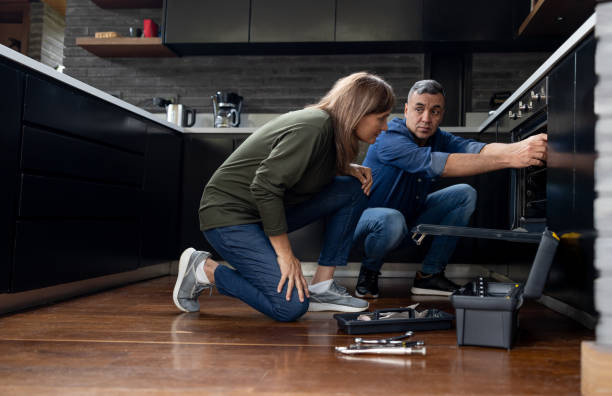Modern kitchens rely on a range of appliances to keep things running smoothly. From keeping your food cold to helping you cook dinner, these machines are essential. But when something goes wrong, it can throw off your entire routine. Knowing the most common issues and how to handle them can save you time, stress, and money.
Refrigerator Not Cooling Properly
One of the most frustrating problems in any kitchen is a refrigerator that isn’t keeping food cold. This could be caused by dirty condenser coils, a broken fan, or a faulty thermostat. Before calling a professional, check the temperature settings. Clean the coils behind or underneath the fridge. If that doesn’t fix the issue, it’s best to get expert help. Maintaining your fridge is key. Avoid overloading it. Make sure the door seals are tight and clean. A small issue can quickly become a big one if ignored.
Oven Not Heating Evenly
Uneven heating can ruin your meals. Often, the problem lies with a worn-out heating element or a faulty temperature sensor. You might notice your food is undercooked in some areas and burnt in others. To test this, try using an oven thermometer. If there’s a big difference between the set and actual temperature, it’s time for a repair. Stove & Oven Range Repair may be needed if you notice consistent heating issues, unusual smells, or visible damage to heating elements.
Freezer Over-Freezing or Not Freezing at All
A freezer that over-freezes can lead to ice buildup, making it hard to open drawers or doors. On the other hand, if it’s not freezing at all, food safety becomes a concern. Check the defrost timer and thermostat. Sometimes, a simple reset can help. Freezer and refrigerator repair services can fix these issues before they cause food spoilage or more expensive damage.
Dishwasher Not Cleaning Dishes
If your dishwasher isn’t cleaning dishes properly, check the spray arms for blockages. Hard water can cause buildup over time. Also, make sure you’re using the right detergent. A clogged filter can also reduce cleaning performance. Run a cleaning cycle using dishwasher cleaner. If that doesn’t solve the problem, the pump or motor might be failing. At that point, a professional diagnosis is helpful.
Microwave Not Heating
A microwave that runs but doesn’t heat is often due to a faulty magnetron. This is not a DIY fix. These parts can store dangerous electrical charges even after being unplugged. A tripped door switch could also be the cause. If the light turns on but your food stays cold, stop using the microwave and get it checked. Continued use could worsen the issue.
Garbage Disposal Not Working
When the garbage disposal stops working, the first thing to check is whether it’s plugged in. If it hums but doesn’t turn, something might be jammed. Use a hex key to manually turn the blades from underneath the unit. Avoid putting fibrous foods, grease, or large bones down the drain. These can clog the system. Regular maintenance helps prevent jams and motor burnout.
Washer and Dryer Issues
Though not technically kitchen appliances, many homes have laundry machines nearby. Common issues include the washer not draining and the dryer not heating. Always check the lint filter and ensure hoses are free from clogs. For washers, make sure the drum is balanced. Uneven loads can cause loud noises or failure to spin. Address small problems early to avoid major breakdowns.
When to Call a Professional
Some appliance issues can be solved with simple maintenance. But others need professional attention. If your appliance shows signs of electrical problems, loud noises, or unusual smells, don’t wait. Unplug it and call for help. Trying to fix certain components on your own can be dangerous. Electrical parts and high-pressure systems require training and proper tools. It’s worth investing in expert service to ensure safety and long-term performance.
Preventative Tips for Longer Appliance Life
-
Clean coils, filters, and seals regularly.
-
Avoid overloading machines.
-
Use the right detergents and settings.
-
Schedule annual inspections for older appliances.
-
Fix minor issues before they become major.
Simple habits can help you avoid costly repairs and keep your appliances running smoothly.
Conclusion
Kitchen appliances are a big part of daily life. When they fail, it’s more than just an inconvenience. Knowing what to look for, how to troubleshoot, and when to call for help can make a big difference. Stay proactive with maintenance, and don’t ignore the warning signs. That way, your kitchen stays efficient and stress-free.









